How do you raise a responsible child? While there’s no magical formula, there are some ways we can inspire responsible behavior. Here’s how.
If you’ve been a parent even for a short amount of time, you’ve probably realized teaching responsible behavior is one of the most important things we can do, yet one of our biggest challenges.
It’s pretty easy to see that we’re fighting the culture upstream when we strive to uphold responsibility, accountability, and honorable behavior as values we expect from our kids.
But we can be sure that our kids won’t absorb responsibility through osmosis!
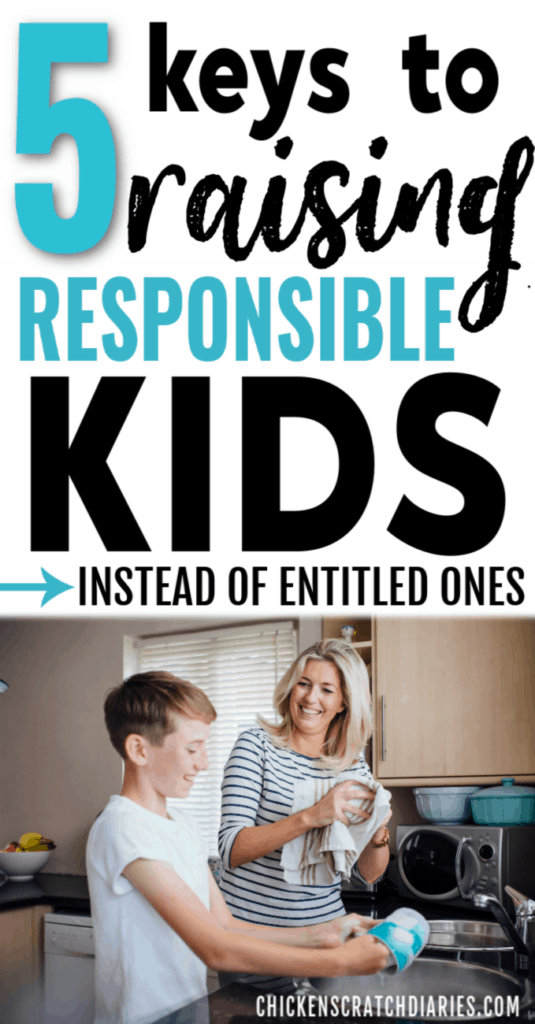
I’m learning that it takes some intentional steps to get there, and a lot of follow-through on the accountability end.
How to raise a responsible child
When we’re focused on the big picture, I believe that it IS possible to raise responsible kids in an entitled world, and it’s more than worth the effort.
There are 5 key areas that seem to be building blocks to developing these traits.
#1. Set Boundaries between your responsibilities and theirs
We hear about boundaries all the time and how important they are to any relationship, but most of us struggle with maintaining them with our kids.
From the moment they’re born, they tend to test our boundaries!
Whether it’s getting them to sleep in their own beds, teaching them to pick up their toys —
— or insisting we share every third bite of our ice cream with them, kids are boundary-crossers to the core.

Of course, some of these boundaries are more important than others.
This post likely contains affiliate links. Please see our disclosure for more info.
Recognizing boundaries
We might not really mind when our toddlers crawl into bed with us because we realize these moments won’t last.
We allow and invite the invasion of our personal space because that’s what being a parent to little ones entails, right?
In Boundaries with Kids, Dr. Henry Cloud discusses the concept of teaching kids to “pull their own little red wagon” of responsibility as they grow.

So when do we know when it’s time for them to pull that wagon? In what ways should we set age-appropriate, healthy boundaries for our kids?
Here are some ideas and examples:
Making lunches/snacks
If you keep healthy snacks at eye-level in the fridge or pantry, even the younger kids can grab their own snacks.
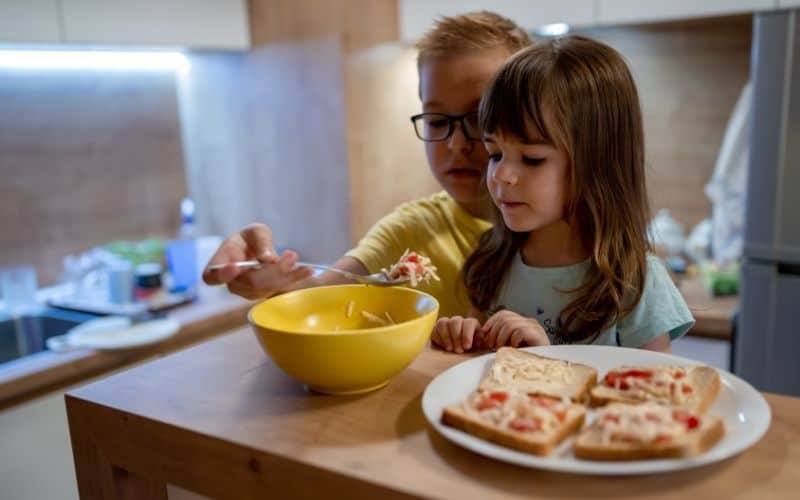
I try not to micromanage every snack my kids eat, but one rule we have is that snacks go in the one-cup containers (like these).
This is so that they learn to eat reasonable portions, and they don’t wipe out an entire box of snacks in one sitting!
My 5-year-old knows how to make a peanut butter and jelly sandwich and I encourage the kids to pitch in and help with lunches and dinners.
It’s important they learn how to make basic meals as we go.
Breakfast is one of the easiest meals for kids to make if you keep it simple: cereal, toast with peanut butter and fruit and hard-boiled eggs are a few of my kids’ favorites.
We’ve also learned a lot from the Kids Cook Real Food courses.
It can teach more independence in the kitchen and it makes cooking fun!
Cleaning up after meals
Get your kids in a habit of bringing their dishes to the sink, throwing away their own trash and cleaning up their own spills.
Even toddlers can get on board with a little practice.
If they’ve already been doing this you can step it up a level and teach them how to load the dishes in the dishwasher.
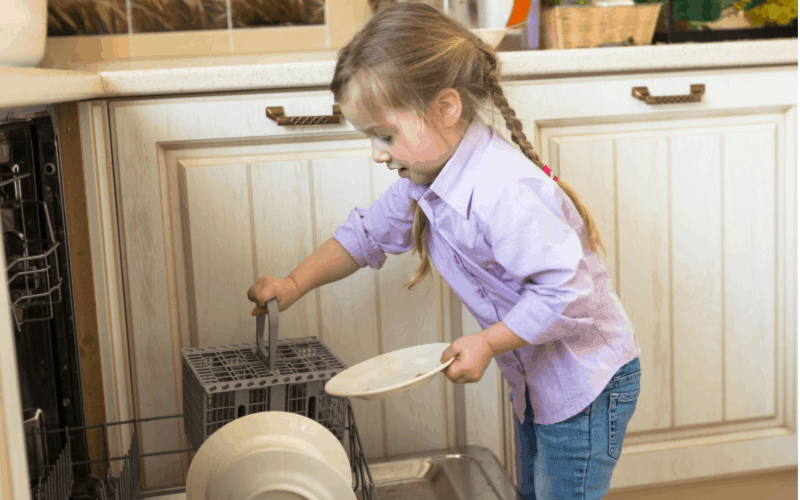
Even if you have to rearrange the dishes a bit afterwards, it’s a great skill for kids to learn.
Bottom line: Mom shouldn’t be left to play the busgirl after every meal!
Homework
This is one area a lot of parents get sucked into and take on more responsibility than is theirs to own.
(Been there, done that!)
It can really be a chore to get kids to do their homework, but it shouldn’t have to be.
I’ve learned to set expectations for homework and not stress over how it’s done.
At the end of the day, it’s THEIR responsibility.

They’re the ones in the class receiving the instructions.
They’re the ones that need to learn the material, not us as the parent.
Have a time set aside for homework each evening.
We have snack time and homework time as soon as we get home, with the expectation that homework will be done before dinner is ready (if possible).
This way they’re not suddenly “remembering” they have homework to do right before bed.
Utilize extra resources
One great tip I learned from the course, Family Routines, is to have “mom’s office hours”.
This is where kids can ask you questions for 30 minutes (or however long you want to devote).
After that, they’re on their own with their homework.

I’ve had to draw a boundary with bringing forgotten homework assignments to school as well.
Usually once is all it takes to be caught empty-handed with that project or assignment that was left on the counter.
Don’t let your kids’ school assignments become a battleground, and don’t continually take on these responsibilities as your own!
Putting away belongings
Something I’ve instituted recently (that I should’ve done a long time ago) is:
Catching those tasks where I’m constantly picking up after my kids and putting that chore back on their shoulders instead.
When we get home, EVERYTHING has to be brought in from the car.
Backpacks and shoes must be put away, not thrown by the back door.
Lunchboxes need to be emptied (by them, not me!) and ready for the next day.
—GET THE PDF GUIDE—
Want the ad-free version of this post? I’ve created a printable PDF guide for parents which includes the full text from this article plus reflection worksheets for parents, printable Reward “tickets” to encourage responsible behavior, a Task Chart, and Paid Chores Tracker. Download the 25-page printable guide.

All of these things need to be done before snack time, tech time or anything else.
It’s taken some time to make this a habit, and honestly it’s still a work in progress.
The task of raising responsible children is always a work in progress.
(Can I get an amen?)
But it helps SO much when we’re not coming home to chaos every evening, so being consistent with these routines is key.
Keeping rooms clean/tidy
It’s really up to you how “clean” you expect your kids’ bedrooms to be.
But it’s never too early to teach them that what they get out, must be put away.
I do help our younger kids (ages 2 and 5) do a big clean-up about once a month to get things back in order.
But overall, I want them to learn to appreciate a neat space.
Even if it’s not totally clean by my standards, it can at least be hazard-free. 😉
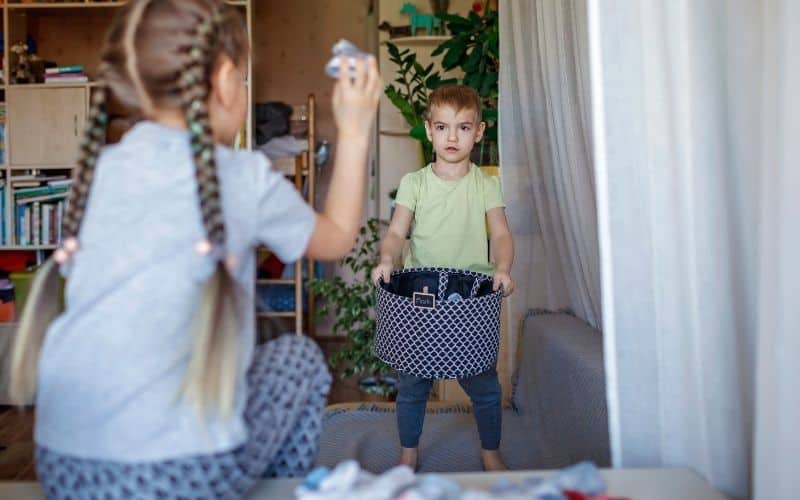
(Read more tips on getting kids to clean their rooms here.)
Paid chores
For my two oldest (11 and 15), we are experimenting with the Greenlight Debit Card for kids.
It’s a prepaid card where I can assign paid chores and transfer money electronically from my checking account to their cards.
This simply keeps me from forgetting to get cash (which is often), and also allows them to shop online with my permission.

There is an app for parents to manage the accounts, and one for kids to see and manage their own balances.
You can set parameters on where they can spend their money, too.
For us, the daily responsibilities (see above) have to be completed before the kids can move onto the paid jobs.
This would be things like loading the dishwasher, sweeping and mopping the floor or watching the younger kids for an hour so mom can catch up on work.
With the Greenlight app, I can assign one-time or weekly chores, enter a due date and how much it’s worth; it will then transfer the money to my child’s card after I approve it.
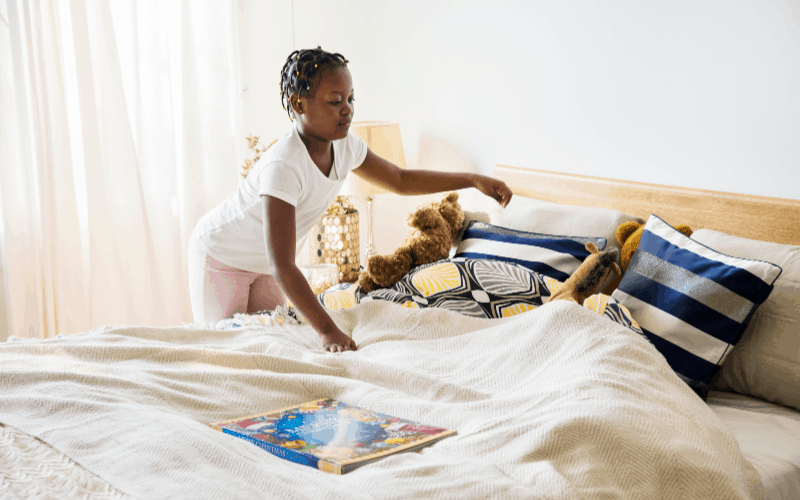
So far, I’m loving how easy it is to use and it’s saving me a lot of time with instructions and tracking what has been done.
Because jobs = responsibility taught = less work for mom! It’s a win-win.
#2. Don’t give warnings/ reminders
Dr. Kevin Leman (Have a New Kid by Friday) says that “Warnings are a disrespectful act”.
Whether you agree or disagree with that statement, it probably makes you think twice about warnings and reminders and the purpose they serve- or don’t.
The point he makes is that by lecturing, nagging, warning, reminding —
–we’re essentially saying to our child that you’re not smart enough or capable of following through.
Be clear and follow through
A more proven approach is to first, make it clear what your child needs to do.
And then, enforce consequences when it’s not done or when the behavior doesn’t meet the standard that’s already set.

Dr. Leman encourages parents to stay positive!
Don’t get all “worked up” by misbehavior or not following through with their chores or responsibilities.
He says you don’t even need to tell them ahead of time what the consequence is, just make it clear it exists.
Nagging versus natural consequences
And really, does nagging or reminding our kids to do things ever help?
Reality consequences – the kind they’ll face in the real world, that is —
–are much more effective in teaching the lesson and cultivating responsibility long-term.
You don’t pull your weight/ behave appropriately / follow the rules, you face the music.
The end.
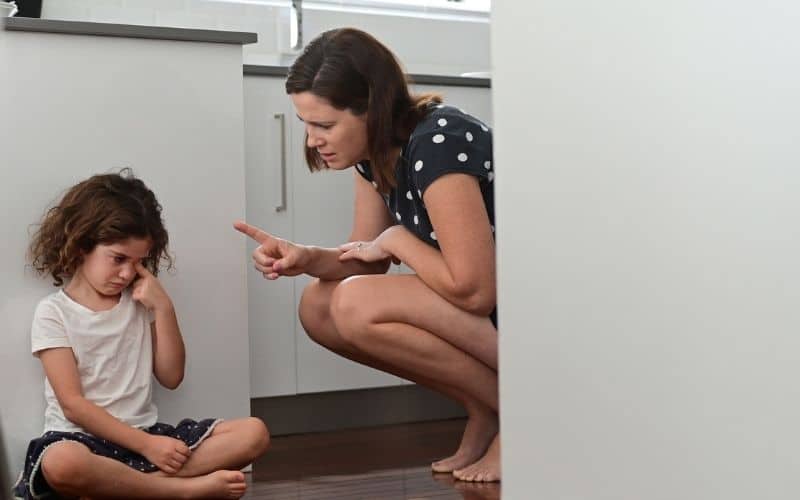
A few examples of things we shouldn’t give reminders for – and ideas for consequences:
Bedtime
My older girls covet the “tucking in” time where we talk one-on-one before bed.
However, if they aren’t in bed by 8:30 with showers done and teeth brushed, they have to put themselves to bed.
I HATE this consequence because I enjoy this time too and really look forward to it.
But it’s been the only consequence that motivates them to be responsible with their time in the evenings.
(Hint: It rarely happens now.)
With our younger kids, routine is super important.

After I brush their teeth, I walk to their room and if they run away, I sit down on the bed and start reading a book out loud.
If they don’t come and join me, they miss out on story time.
Eating Dinner (aka, World War III)
Many a war has been fought at the dinner table between the modern parent and their child.
(Particularly around age 5, am I right?).
Expert advice will vary, but here’s my take- assuming you’ve eliminated a sensory processing disorder:
Don’t play into the dinnertime power struggle.
Serve at least 1 food on their plate that’s halfway healthy (or includes some protein at least!) and that you know they’ll eat.
For us, sometimes it’s a cup of applesauce or a slice of lunchmeat.
Keep serving the other dinner foods alongside and eventually you will see a change over time.
That is, IF you don’t make it a power struggle.
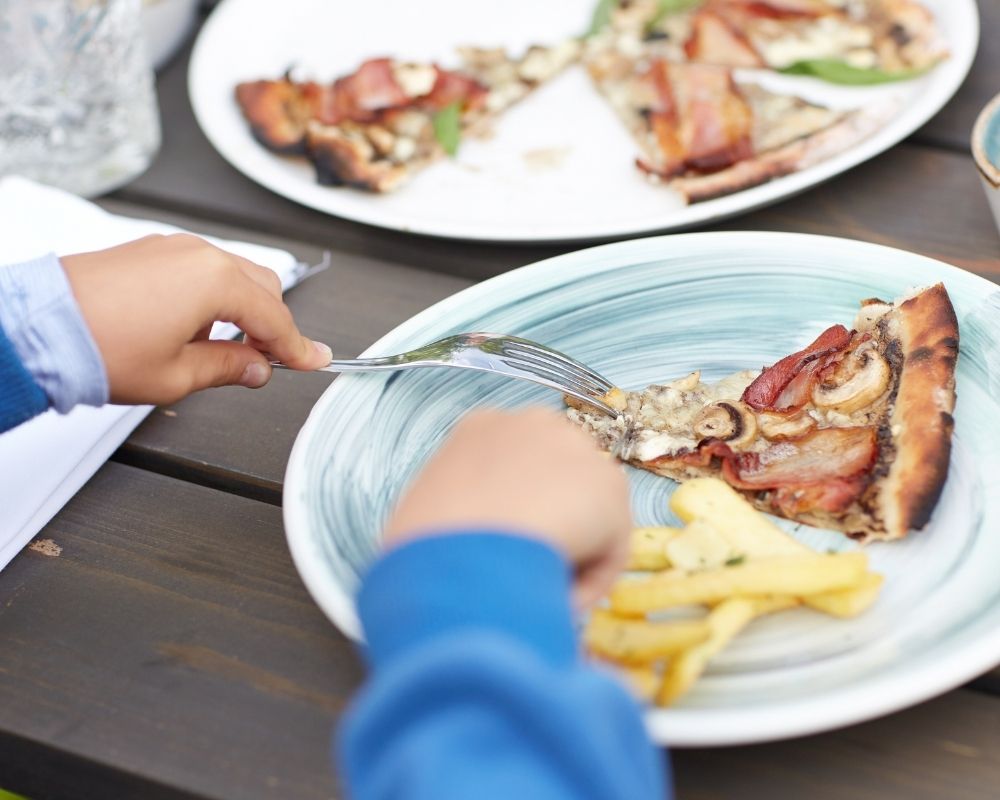
The backfire effect of control
When you insist they eat something, toddlers and preschoolers , particularly those with any amount of spunk —
—will be certain to assert their quest for independence in this area!
You can decide to let them stay at the table until dinner is “over”, if you like.
I think that’s a good rule- and one we’re still struggling with at our house, if I’m honest.
After dinner, if they haven’t eaten, you can cheerfully let them know their plate will be on the table if they get hungry later.

Barring those sensory issues or other special circumstances- they will eat their dinner IF they’re really hungry.
If not, kitchen is closed, lights off at ___pm.
Important: Let go of the guilt
If they go to bed missing one meal one night (or even a few), it is OK.
I promise.
I had this conversation with the pediatrician a few weeks ago who encouraged me to look at bathroom habits.
Regular, normal bowel movements are usually a good indicator they’re eating ok.
If you’re really concerned, TALK to your child’s doctor.
But please don’t let dinner time be the most stressful time of day.

And, remember, stressing over it and creating a negative atmosphere around family meals..
..is totally counterproductive to changing the behavior.
Related post: Why Discipline is so Necessary Yet so Difficult
Assigned chores
Let’s say you assign chores beyond their regular responsibilities:
For example, Saturday morning chores where everyone is required to pitch in.
Be sure to set a reasonable time frame and hold them to it.
Again, you don’t have to say anything after that- no reminders needed.
But when that time comes, decide what the consequence will be if the job is ignored.
If they have plans to go out with friends, and totally shirked their chore – guess what?
They can go next time.

For younger kids, you can take away that day’s TV time, tech time, whatever you know will make an impact.
Keep in mind the point is not to inflict harm as a consequence —
–but making the poor choice itself more painful than the temporary inconvenience of obedience.
#3. Let them fix their own mistakes
From accidents to intentional mistakes, to careless words, we all have to come to an understanding that:
We’re the ones responsible for fixing our own mistakes, or at least attempting to.
When my kids are caught spewing hateful words at their brother or sister, I want them to think about the power of their words.
I want them to consider how it makes them feel when someone else talks to them that way.

Privileges may need to be taken away if the lesson is falling on deaf ears.
I think the problem is we’ve come to expect our kids to treat their siblings much worse than they would anyone else.
But why should we ever allow that?
Also read: Sibling Rivalry and the Road to Brotherly Love
If I overlook hurtful words, I’m teaching them:
A) they can’t help their impulsive behavior (yet they can) and
B) it must be ok for other people to talk to THEM that way (and it’s not).
Responsibility and Respect go hand-in-hand
Having a standard of respect for others and responsibility when that line is crossed should be mandatory.
Hurtful words can be so damaging and so hard to “fix”- so that’s why I’m emphasizing this point here.
Sometimes mistakes can’t be avoided, and we can and must show our kids grace in those moments.
We can empathize, and we absolutely should.
But it’s still important to teach them to make amends, for instance, when they break their sister’s favorite toy.
Help them find ways to earn the money to replace it.
It’s really important for us as parents (and oh, how I struggle here), to be quick to ask for forgiveness for our own mistakes, too.
We need to do our part to make things right, as much as we are able to.

This speaks volumes to our kids who are watching us.
They will notice if we hide from our failures – or humbly own up to them and seek the righteous, responsible path instead.
Related Post: How to NOT overindulge your kids – in a culture of excess
#4. Encourage Good Samaritan Responsibility, too
To this point, we’ve focused on personal responsibility.
But what about our responsibility to others?
While we definitely want to understand the boundaries between what we’re responsible for and what is NOT our burden to bear —
–we also want to be sensitive to opportunities to serve others with responsible behavior.
In the parable of the Good Samaritan, we see a picture of God’s love that should motivate us to go outside our comfort zone and help those in need.
In short, we need to be willing to display love in action.

We hope our kids can learn to not ONLY be concerned about their own personal wants and needs —
–but to be sensitive to real injustice when we witness it, and opportunities to be someone’s answer to prayer.
Because ultimately, when we have the ability to help others, we’re responsible to God for our actions, or inaction.
#5. Notice responsible behavior
Lastly, when these lessons are finally sinking in…
…even when you see a hint of a glimpse of an attempt at responsibility…take note!
Cultivating responsible, honorable behavior in our kids can sometimes feel like Mission Impossible.
But like everything else, it takes practice.
It takes enforcement of boundaries and consequences on a consistent basis.
It also takes love and a lot of encouragement which communicates we believe they will get this!

Teaching kids responsibility as a lifestyle
It doesn’t take much observation of the culture to see that a sense of responsibility is not as highly valued as it should be.
Entitled behavior is bombarding our kids in the form of YouTube personalities, spoiled pop stars and even overindulged kids at school.
So, look for opportunities to tell your kids that you notice and appreciate their efforts in their schoolwork, at home, and in how they treat others.

When they take responsible actions, they set a higher standard that others will notice, too.
This is a character trait that will serve them well at school, in their future jobs and in relationships throughout their life.
Take heart, moms and dads: raising responsible kids is not a lost cause!
With a little help from us, they can learn to pull their “little red wagon” of responsibility – with pride.
Related Products:
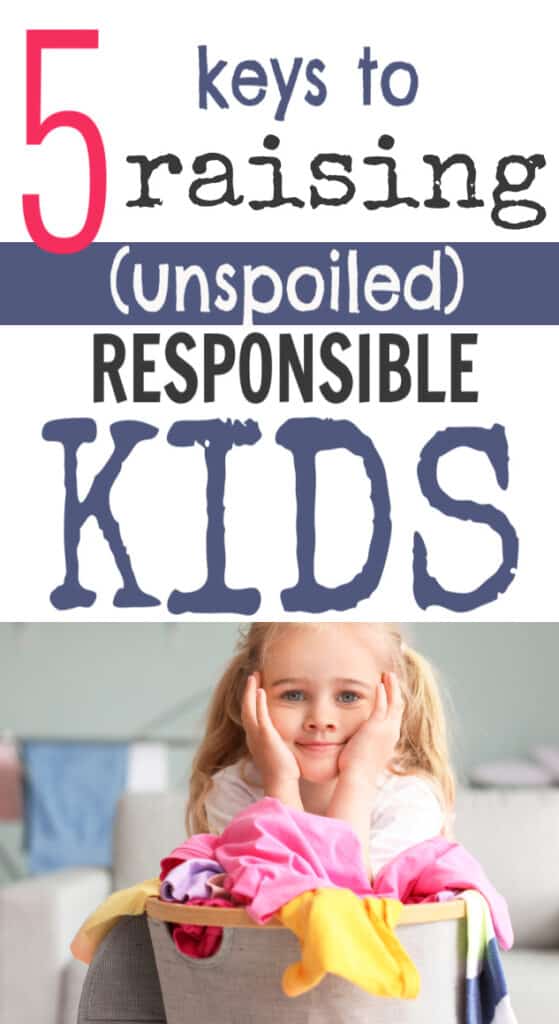
Loved your article. This has recently become a struggle in our parenting with my 5 year old son. Thank you for your expertise. We appreciate it!
Thanks for reading Michelle! Teaching responsibility is a struggle for most (all?) parents at some point in time, and I think some kids need more “learning opportunities” than others too 🙂
I love this article!
Hi Brandi,
Very informative article. I loved the point on assigning unpaid and paid responsibilities to children. A very innovative way to catch them young and teach them the importance of responsibilities.
Hi Brandi,
Thank you for writing this article. Very informative.
I would love to see more about teens, did I miss them?
Thanks for the feedback! This post was geared more towards younger kids, you are right. I plan to add more content in the future about teens. We’re just getting into the teen years with our oldest so I’m taking notes 😉
I love this article so much. I need to keep this in mind as my daughter grows because I am really sick of seeing all of these entitled children everywhere and I want my daughter to actually be a responsible child.
I enjoyed your article very much. I have 3 children (very far apart) 26 yo girl, 17 yo girl, and a 3yo boy. My 26 yo and I are pretty much best friends. She’s recently become a single mom of 2 young children. My 17 yo pretty much acts like she can’t stand me most of the time (teenagers) and my little man can’t live without mommy 😊
I was raised by parents who yelled, fought, and for some time drank. My dad had a full throttle temper that both my brother and I have. However, he seems to control his better than I do. So I’m reading up on parenting because I’d really like my 17 yo to want to be around me and I’d like to not spend the next 15 yrs yelling at my little man. I’d like to show my children and grand children that I can break the awful cycle and teach them to someday be better parents than I feel I have been at times and to grow up to be responsible additions to our struggling society.
Thank you for sharing!
God Bless you
I love your candid honesty Angela, that’s something we can all learn from! Thank you so much for commenting!
I totally agree with Angela!! Brandi I love this article too. It has reminded me of what to do. I want to break the awful cycle of bad parenting style too and I am determine to do it. so much good stuff to do and remember that we are the role models of these people we bring into this world. Thank you so much for writing about this!!
Thanks for stopping by Angela! So glad the post was encouraging to you. Hang in there mom! 🙂
This is the most helpful post I’ve read in a while. I hope you consider writing e-books, e- courses or presenting in live workshops. You have a lot to offer moms. Have an awesome day!
Well thank you Tara! That was a high compliment- and I do hope to implement some of those things in the future. I am glad it was helpful info! 🙂
Thank you so much for this article . I am a mom of 16 year old twins (boy and girl) …. also a 33 yr old son .
The difference between the siblings was teaching accountability , self respect and respect for others , and honesty through communication . Though a young mom with the first child I learned the hard way …. over indulgence due to my own feelings of living in a Payton Place town ….. it proved to be a heartbreak . Not teaching responsibility and accountability my young adult son is suffering in today’s world for lack of facing the consequences of his own actions . His life is a riddle of blaming others and repeating the same behavior expecting different results .
With my twins , having them at an older age taught me the value of my own beliefs . Not following the trends and entitlement error of today’s society it has proven two fold in ways I could not have even imagined . Both children are such old souls in little bodies and have been from the start . Teaching them self respect , respect for others , the rule of consequences by action ( every decision that is made has a consequence whether it be good or bad ) …… these are just a few things I made a point to spend the time teaching at such an early age because it is so important in molding a responsible caring , loving contributing person to society … verses an entitled non caring rude person that thinks the rules don’t apply to them . I am living proof that having two separate families( having children at a very young age and having children at an older age ) by way of age gaps between siblings ….that time spent teaching your children from the start of an early age will not only pay off huge in ways one could never imagine but will also help your children know the true value of what is important in this self indulging self entitled world we live in today .
Thank you for sharing your wisdom, Michelle.
I am so thankful for this post right now, as we navigate responsibility with our child. I appreciate your honesty about your own struggle with some aspects. This was an honest, helpful, and ENCOURAGING post. Thank you so much!!!
Kirstie, I’m so happy to hear that it was encouraging to you 🙂
This has been a great read! Thank you for sharing!
Great info! Many things in here I wish I had implemented better when raising my children but will apply what I can with my grands!
Great resource and very practical I am glad I came across this now. Thank you
Thank you Abigail!
This has to be one of my favorites! As a mom, I feel like the pressure is always on to raise strong and independent kids. These tips are great for teaching responsibility, thank you!!
The pressure is real! 🙂